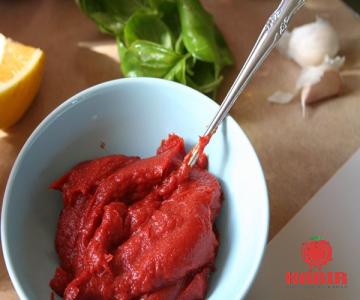Tomato paste, a common ingredient found in various cuisines worldwide, is celebrated for its rich flavor and versatility in cooking. However, beneath its delectable taste lies a hidden truth – tomato paste can be unhealthy. In this article, we will explore the potential health risks associated with consuming tomato paste and shed light on why it should be consumed in moderation. 1. High Sodium Content: One of the primary concerns surrounding tomato paste is its high sodium content. Sodium is an essential mineral for our body, but excessive intake can lead to detrimental health effects.

.
 According to the American Heart Association, a high-sodium diet may contribute to an increased risk of high blood pressure, heart disease, and stroke. Tomato paste often contains added salt as a preservative, significantly elevating its sodium levels. 2. Concentrated Sugar: Tomato paste’s flavor is intensified through a process of reduction, which inevitably leads to a higher sugar concentration. While tomatoes naturally contain sugars, the concentration becomes much higher in tomato paste. Regularly consuming foods high in sugar can lead to weight gain, tooth decay, and an increased risk of developing chronic conditions such as type 2 diabetes and heart disease.
According to the American Heart Association, a high-sodium diet may contribute to an increased risk of high blood pressure, heart disease, and stroke. Tomato paste often contains added salt as a preservative, significantly elevating its sodium levels. 2. Concentrated Sugar: Tomato paste’s flavor is intensified through a process of reduction, which inevitably leads to a higher sugar concentration. While tomatoes naturally contain sugars, the concentration becomes much higher in tomato paste. Regularly consuming foods high in sugar can lead to weight gain, tooth decay, and an increased risk of developing chronic conditions such as type 2 diabetes and heart disease.
..
 3. Processing and Nutrient Loss: The production of tomato paste involves intense heat and processing methods, which can diminish the nutritional value of the tomatoes. During the manufacturing process, essential vitamins and minerals, such as vitamin C and potassium, may be reduced. As a result, the nutritional benefits originally found in fresh tomatoes are compromised, leaving behind a less wholesome product. 4. Possible Allergens: Tomato paste may pose a potential risk for individuals with allergies or sensitivities to specific ingredients. Some brands of tomato paste contain additives or flavor enhancers that can trigger adverse reactions in susceptible individuals. It is crucial to read labels carefully to avoid ingredients that may cause allergic reactions or discomfort.
3. Processing and Nutrient Loss: The production of tomato paste involves intense heat and processing methods, which can diminish the nutritional value of the tomatoes. During the manufacturing process, essential vitamins and minerals, such as vitamin C and potassium, may be reduced. As a result, the nutritional benefits originally found in fresh tomatoes are compromised, leaving behind a less wholesome product. 4. Possible Allergens: Tomato paste may pose a potential risk for individuals with allergies or sensitivities to specific ingredients. Some brands of tomato paste contain additives or flavor enhancers that can trigger adverse reactions in susceptible individuals. It is crucial to read labels carefully to avoid ingredients that may cause allergic reactions or discomfort.
…
 5. Quality and Source: The quality and sourcing of tomato paste can also impact its overall healthiness. Paste made from conventionally grown tomatoes may contain pesticide residues, which can pose health risks. Choosing organic or locally sourced tomato paste can mitigate this concern. Additionally, opt for brands that prioritize sustainability and ethical practices, ensuring a healthier and more environmentally friendly product. Conclusion: While tomato paste can add depth and flavor to a variety of dishes, it is important to be aware of its potentially unhealthy aspects. High sodium content, concentrated sugars, nutrient loss, possible allergens, and questionable quality and sourcing are legitimate concerns for those seeking a healthier lifestyle. To enjoy the benefits of tomato paste without compromising your well-being, it is crucial to consume it in moderation, choose low-sodium options, and prioritize high-quality, organic varieties. By adopting these practices, you can continue to savor the rich taste of tomato paste while prioritizing your health and well-being.
5. Quality and Source: The quality and sourcing of tomato paste can also impact its overall healthiness. Paste made from conventionally grown tomatoes may contain pesticide residues, which can pose health risks. Choosing organic or locally sourced tomato paste can mitigate this concern. Additionally, opt for brands that prioritize sustainability and ethical practices, ensuring a healthier and more environmentally friendly product. Conclusion: While tomato paste can add depth and flavor to a variety of dishes, it is important to be aware of its potentially unhealthy aspects. High sodium content, concentrated sugars, nutrient loss, possible allergens, and questionable quality and sourcing are legitimate concerns for those seeking a healthier lifestyle. To enjoy the benefits of tomato paste without compromising your well-being, it is crucial to consume it in moderation, choose low-sodium options, and prioritize high-quality, organic varieties. By adopting these practices, you can continue to savor the rich taste of tomato paste while prioritizing your health and well-being.











Your comment submitted.